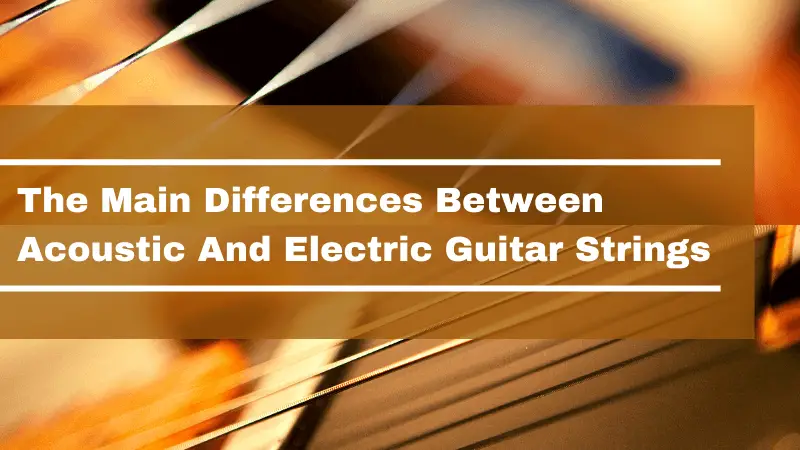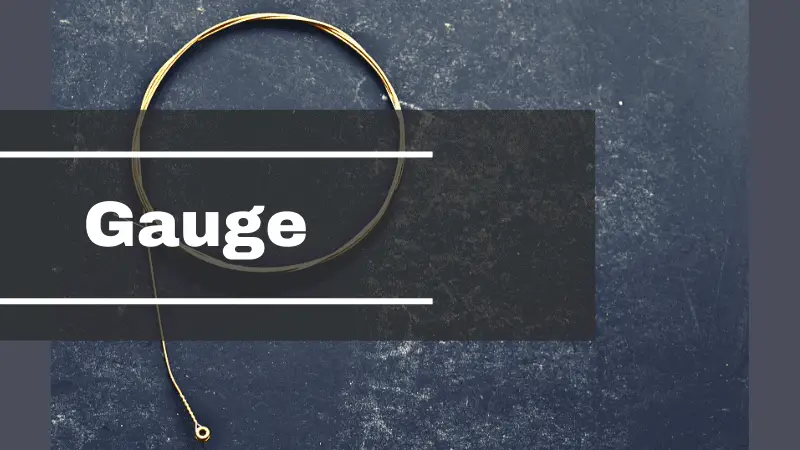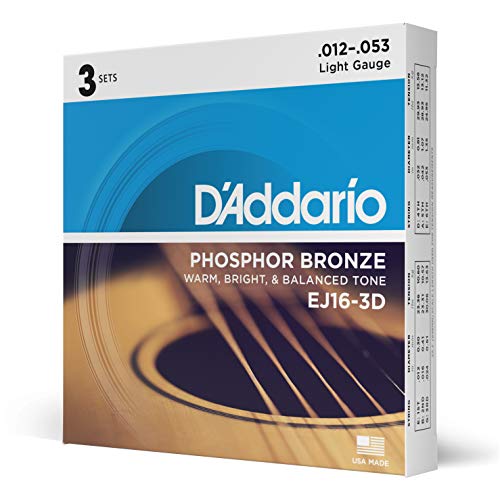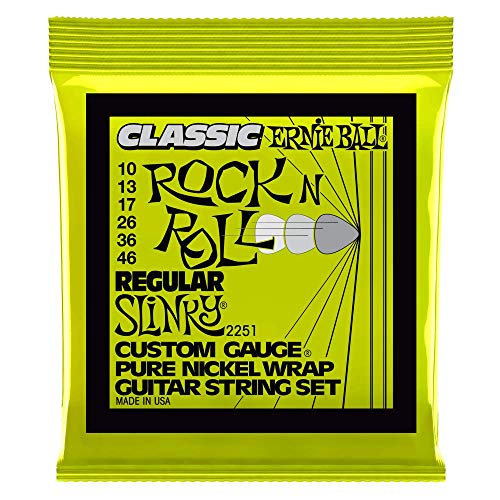In this in details explanation, you’ll learn everything you need to know regarding “Can I Use Acoustic Strings On Electric Guitar?” with Our Pro Tip!
Can I use acoustic strings on the electric guitar? That’s probably a question asked by most beginners and a pretty valid one, in our opinion. If you started learning how to play the instrument with an acoustic guitar (like most do), then transitioning to an electric guitar is one of the most curious and exciting experiences one can have.
So for acoustic guitar players, it’s only right to ask if you can still use the same set of strings for an electric guitar. Most pros or seasoned guitarists know and use the appropriate set of strings, of course. Acoustic strings for acoustic guitars and electric strings for electric guitars, that’s how it should be. But why? Let’s find out.
Related Complete Buying Guides:
- Best Acoustic Guitars Under 100
- Best Acoustic Guitars Under 200
- Best Acoustic Guitars Under 300
- Best High-End Acoustic Guitars
- Best Electric Guitars Under 200
- Best Electric Guitars Under 300
- Best Electric Guitars Under 500
What Are the Main Differences Between Acoustic and Electric Guitar Strings?

Resonance, feel, tone, sound, and the presence of electronics on an electric guitar are the top reasons why acoustic guitar strings are not recommended for electric guitars. They built differently using different materials so they would create that unique sound that we hear from music.
Acoustic guitars have their own tone and are meant for specific songs, and that’s the same story for electric guitars. Here are the main elements that make acoustic guitar strings, not 100% suitable for electric guitars.
Materials of Acoustic Guitar Strings
The materials used for acoustic guitar strings are the main reason why they act the way they do once used on electric guitars. We’re, of course, working within the realms of electrical engineering here. And, of course, the strings you choose affect your guitar tone.
Also, for acoustic guitar strings, what you need to know beforehand is that they are made (the wire itself) out of either steel or nylon. The winding and coating are the elements that determine the difference and classified these strings per type.
80/20 Bronze (aka Bronze, Brass)
These strings are actually made out of 80% copper and 20% zinc. These strings give your guitar a bright but cutting sound. These strings will give your acoustic guitars a significant high-end response, so your instrument would sound tinny and thin.
These strings are mostly recommended for larger or full-sized acoustic guitars to compensate for their natural tone.
Example: D’Addario EJ-11
- D'Addario's most popular acoustic gauge, ideal balance of tone and playability
- Extra-bright tone mixed with deep and projecting bottom end
- String Gauges; Plain steel .012, .016, Nickel Wound .024, .032, .042, .053
- Corrosion resistant packaging for fresh strings, always!
- Made in the U.S.A. for the highest quality and performance
Phosphor Bronze
If you are looking for a warmer sound, then go with Phosphor bronze strings. They, too, would give your guitar a high-end response, but it’s subtler than how the 80/20 bronze strings do.
These are a versatile set of strings used in a wide array of musical genres. They are perfect for country music as well, thanks to that warm tone. They are great for small-bodied guitars, and if you do a lot of plucking, then these are the strings for you.
Example: D’Addario EJ16-3D
- MOST POPULAR – Pursue your passion with D’Addario’s most popular acoustic guitar string set, the Phosphor Bronze Acoustic Guitar Strings. Since 1974, phosphor strings have been known for superb, long-lasting tone and comfortable playability. They are the choice of professionals worldwide.
- INSPIRING PERFORMANCE – These light acoustic guitar strings help you achieve amazing performances, as they offer a long-lasting, warm, bright, and balanced acoustic tone with excellent intonation.
- CORROSION-RESISTANT – These strings feature a precision wound corrosion-resistant phosphor bronze wire that is carefully drawn around a hexagonally shaped, high-carbon steel core. The result is a consistent, long-lasting tone.
- STRING GAUGES – The string gauges in this acoustic string set include: Plain Steel .012, .016, Phosphor Bronze Wound .024, .032, .042, .053.
- MADE IN THE USA – D’Addario leverages centuries of string-making experience and advanced computer-controlled winding technology to bring you the most durable, consistent, and long-lasting guitar strings. Made in the USA for the highest quality and performance, only D’Addario strings are sealed inside and out.
Silk And Steel (aka “Compound Strings)
Compound strings, or what is known as silk and steel strings, combine the elements of steel and classical strings. They generally have a mellow tone, plus they have lower string tension. The great feel and playability are what it brings to your guitar.
You’ll have that feeling that you’re playing a classical guitar, but then again, you get to have the versatility of steel strings.
Aluminium Bronze
These are crispier, featuring higher clarity than phosphor bronze.
Polymer-Coated
These have less brightness and less sustain than uncoated strings with higher warmth.
Brass
These sets of strings are metallic and bright by character.
Materials of Electric Guitar Strings
Usually, electric guitar strings are made of metal alloys that are conducive magnetically, which is crucial for magnetic pickups. Some of the common materials are below:
Nickel-Plated Steel
If you’re looking for a more mid-range attack with sharp and crispy details, then nickel-plated strings are right for you. Do a lot of solos or licks? Go for this set.
Example: D’Addario NYXL1046-3P
- PLAY FEARLESSLY –D’Addario’s NYXL Nickel Plated Electric Guitar Strings feature a newly engineered, break-resistant, high-carbon steel core and plain steel alloy that gives you a whole new level of freedom, confidence, and power in your playing. These strings can keep up with your whammy bar dives and bends.
- STAY IN TUNE – With NYXL’s improved tuning stability compared to traditional nickel wound strings, you can get in tune faster and stay in tune better. The corrosion-resistant packaging of the 3-pack keeps your extra string sets fresh.
- CUT THROUGH THE MIX – NYXL nickel-plated wound strings feature an enhanced mid-range frequency response in the 1 - 3.5 kHz range which gives you more presence and crunch to cut through the mix.
- STRING GAUGES – NYXL1046-3P offers an ideal combination of comfortable playability and ideal electric tone: Plain Steel .010, .013, .017, Nickel Wound .026, .036, .046.
- MADE IN THE USA – D’Addario leverages centuries of string-making experience and advanced computer-controlled winding technology to bring you the most durable, consistent, and long-lasting guitar strings. Made in the USA for the highest quality and performance, only D’Addario strings are sealed inside and out.
Pure Nickel
Pure nickel strings have warmer and fuller tones. They also have more on the bass register rather than on the mids. Perfect for heavy musical genres. Do you do a lot of riffs? This is the right string for you.
Example: Ernie Ball Classic (P02251)
Stainless Steel
This set of guitar strings has the brightest and sharpest tones. They feel different to play on, and they are usually long-lasting. They are pretty versatile and great for classic rock music, hard rock, and heavy metal.
Example: Fender Stainless Steel 350S
- Fender stainless 350s are an excellent choice for heavier styles of music, such as hard rock and heavy metal.
- The pure stainless steel wrap has a high resistance tooil, acid, and sweat for long life and a brilliant tone.
- Their bright, aggressive tone also complements guitars made of dark-sounding tone-woods such as mahogany and poplar.
Chrome
Warmer tones and less resonance are some common characteristics of these strings. Chrome is perfect for blues and jazz players.
Example: D’Addario Chromes ECG24 (Jazz Light)
- LOVED WORLDWIDE – Pursue your passion with the world’s most popular flatwound strings, D’Addario XL Chromes electric guitar strings. They offer the perfect balance of smooth feel and warm, mellow, fat tone. Corrosion-resistant packaging ensures your strings are always fresh.
- FOR THE ULTIMATE PERFORMANCE – D'Addario flat wound stainless-steel strings are expertly “ribbon” wound onto a complex series of interlocking under-windings then precisely polished for an ultra-smooth feel with virtually no finger noise.
- FOR JAZZ AND MORE – XL Chromes deliver a round, full low end without losing punch, making them the ideal strings for traditional jazz, rockabilly twang, R&B, and some pop/rock styles of playing.
- STRING GAUGES – The gauges in this electric string set include: Plain steel .011, .015, and Nickel Wound .022, .030, .040, .050.
- MADE IN THE USA – D’Addario leverages centuries of string-making experience and advanced computer-controlled winding technology to bring you the most durable, consistent, and long-lasting guitar strings. Made in the USA for the highest quality and performance, only D’Addario strings are sealed inside and out.
Titanium
Their tonal characteristics are much brighter, and they are higher in strength.
Example: Ernie Ball Coated Regular Slinky (P03121)
- Titanium reinforced on the ball-end of the string.
- All wound strings are treated with a micro-thin layer of enamel that prevents decay and corrosion up to five times more than uncoated sets.
- In addition to treating the wound strings, each plain string features a rust-resistant plating along with a patented reinforcement winding of titanium wire.
- Titanium's inherent strength helps to prevent string breakage, string slippage, and is proven to keep your guitar strings in tune better than conventional plain strings.
- Preferred by players across many genres, Regular Slinky’s 10-to-46 gauge has become the industry standard.
Cobalt
Cobalt strings are excellent in pickup response and have a wide variety of ranges.
Example: Ernie Ball Cobalt Regular Slinky (P02721)
- Cobalt produces a stronger magnetic relationship between pickups and strings, resulting in increased output.
- Cobalt electric guitar strings provide an extended dynamic range, incredible harmonic response, strong low end, and crisp, clear highs.
- Wound strings consist of Ernie Ball’s Cobalt alloy wrapped around a tin-plated high-carbon steel core wire.
- Preferred by players across many genres, Regular Slinky’s 10-to-46 gauge has become the industry standard.
- Made in the USA.
Color-Coated
It features a variety of tonalities.
Example: DR Black Beauties 9-42
- Black beauties - Black colored electric Guitar strings: light 9-42
- Feature a hexagonal core wire and a nickel-plated steel wrap wire to maintain brightness and feel
- All strings in the set are coated with a jet-black version of dr’s K3 ultra-hard coating
- Delivers longevity, more projection, fewer unwanted overtones, and outstanding clarity and articulation
- 9, 11, 16, 24, 32, 42
- This coating includes a corrosion inhibiting lacquer for extra protection against damaging substances
Polymer-Coated
It has comparatively less sustain.
Example: Elixir Polyweb Light
- Electric guitar strings constructed with nickel-plated steel wrap wire
- Played for a warm, robust tone
- Original POLYWEB Coating provides a soft, slick feel that keeps the strings from getting in the way of playing
- Our patented coating technology protects against common corrosion, extending tone life longer than any other brand’s coated or uncoated strings (Elixir Strings player survey)
- Light gauge: .010 .013 .017 .026 .036 .046
Gauge

Beginners probably won’t care much about gauge but this one’s pretty important. Gauge affects tone, feel, and, most of all, sound quality.
Generally, acoustic guitar strings are gauged higher, but that doesn’t mean it can’t match your electric guitar strings when it comes to the gauge you desire. After all, both sets of strings have a varying range of gauges from the low E to the high E string.
It’s easy to know which gauge to use for your acoustic guitar. The larger the guitar is in terms of its body size, the higher the gauge it is recommended to use for them.
The lightest gauge would be 0.08 (for the lighter string: high E) with the heaviest 0.59 (for the low E). Jazz Players usually use these heavy gauge flatwound strings. We will talk more about winding types later in this article. A usual set is from 0.08 to 0.38, and that’s for an acoustic guitar set usually referred to as extra super light.
The Superlight is from 0.09 to 0.42, and the medium/light gauge is from 0.10 to 0.46. Heavy or thicker strings are from 0.12 to 0.52.
Jazz Players usually use heavy gauge flatwound (winding type) strings. Keep reading to know more about winding types.
Winding Type
The type of winding a string gets determines its intonation. Good quality strings are winded in such a way that they stay in tune for longer periods and feel right. Manufacturers have provided us with options to choose from these 3 types of strings: Roundwound (uses round wires), flatwound (uses flat wires), and groundwound (hybrid).
The most popular among these are the roundwound strings. And the groundwound is the least popular one. Flatwound strings suit best for jazz guitarists and are also popular as bass strings. But roundwound is the preferable one for electric guitars.
See this video to experience the tonal differences between flatwound and roundwound strings and get to know what’s better:
String Core
Round core or hex core? Which one suits your guitar playing best?
Round core strings are your OGs or vintage guitar strings. This type of core makes sure that a lot of its winding comes in contact with it, and that affects the sound produced. On the other hand, hex-core guitar strings are usually for modern-sounding electric or acoustic guitars.
What Strings Do Electric Guitars Use?
Electric guitars use strings that usually have steel-core metal composite strings with different ranges of thicknesses. These are referred to as gauges. The strings of an electric guitar can be made from different materials, which will affect the sound of the instrument. Electric guitar strings are typically thinner than acoustic guitar strings, which gives them easier playability.
Do Electric Guitars Need Metal Strings To Work Properly?
Yes, to work properly, the electric guitar needs metal or steel strings. This is because electric guitar produces sound by using electromagnetic induction. When the string vibrates, it produces a magnetic field, which then induces an electric current in the guitar pickups. This current is then amplified and sent to the speakers. The metal strings are necessary to produce this magnetic field.
Can I Use Acoustic Strings On Electric Guitar?

Theoretically, acoustic strings will work on electric guitars, and electric guitar strings will work on acoustic guitars. You can try, putting acoustic strings on electric guitar but it’s not recommended to use acoustic strings on an electric guitar in general. It just won’t feel right and won’t sound right. The electric guitar does not use the same strings as an acoustic guitar. As we mentioned, these acoustic guitar strings are coated with different materials, and they are winded a bit differently. While you can use acoustic strings on an electric and get sound out of them, only the first two strings will sound like electric guitar strings.
They are often thicker and will have higher tension. They are also meant for different songs that you can play, so if you want to sound like your favorite electric guitarist, then string the right way.
Acoustic guitar strings also respond (or do not) differently to the electronics, specifically the pickups of your electric guitar. Due to the materials used for acoustic guitar strings, these pickups just won’t resonate well with them.
What Happens If You Put Acoustic Guitar Strings On An Electric Guitar?
If you’ve ever wondered what would happen if you put acoustic guitar strings on an electric guitar or use electric guitar strings on an acoustic guitar, you’re not alone. It’s a common question that pops up among guitar players of all levels of experience. While it might seem like a good idea to use acoustic strings on your electric guitar for what might be the reason, there are actually a few potential problems that can occur.
The most obvious issue is that the string tension of an acoustic guitar is much higher than that of an electric guitar. This means that the acoustic strings will be much more likely to buzz and rattle against the frets when played at high volumes. In addition, the higher string tension can cause the acoustic strings to slip out of tune more easily than electric guitar strings.
Another potential problem is that the different gauge (thickness) of acoustic strings can cause problems with the intonation (tuning) of your guitar. If the string gauges are too different, the bridge and saddle of your guitar may not be able to properly adjust the strings, resulting in an out-of-tune guitar.
Finally, the biggest issue of using an acoustic string on an electric one is the sound output won’t work properly because of the magnetic field of an electric guitar. The magnetic pickups of an electric guitar are what amplifies the sound and give it its unique tone. Acoustic strings, on the other hand, are not magnetized and will, therefore, not interact properly with the pickups, resulting in a very muted and unappealing sound.
So, while it is technically possible to put acoustic guitar strings on an electric guitar, it’s not generally recommended. If you’re looking for the perfect tone for your electric guitar, there are plenty of options available specifically designed for electric guitars. These strings will give you the best combination of tone, intonation, and string tension, without the risk of buzz or slippage.
How Do Acoustic Guitar Strings Sound On An Electric Guitar?
As I already mentioned, acoustic strings won’t sound appealing if used in an electric one, as you will get a very weak, muted, and unbalanced sound. Moreover, the strings will not be able to produce the same volume as they would on an acoustic guitar. This is because electric guitars are designed to work with electric strings that can handle the magnetic field of the pickup. And also, the sound of an acoustic guitar string is not meant to be amplified.
Are Electric and Acoustic Strings Interchangeable?
Though, a set of acoustic strings will work technically on an electric one. But, it won’t sound like an electric. Similarly, a set of electric strings will work on acoustic guitar. But, it won’t sound like an acoustic, that’s why it’s not recommended. So, the answer is – No. Electric and acoustic strings are not interchangeable and shouldn’t be used interchangeably because of the various facts I have discussed above.
Why Do Acoustic and Electric Guitars Utilize Different Winding Materials?
Acoustic and electric guitars utilize different winding materials because electric guitars need to be able to generate a louder, more powerful amplified sound than acoustic guitars. Acoustic guitars typically have thicker, heavier gauge strings that are wound with phosphor bronze or bronze, while electric guitars usually have thinner, lighter gauge strings made of steel. The different materials and string gauges help to create the unique sound of each type of guitar.
Why Do Acoustic Guitars Have One More Wound String?
Set of the acoustic guitar strings usually includes two unwound and four wound strings. Acoustic guitars have one more wound string than electric guitars. The extra string gives the acoustic guitar a fuller, richer sound without amplification. Wound strings are made of a thicker gauge of wire than regular strings. This makes them last longer and stays in tune better.
What About Nylon/Classical Strings On Electric Guitar?
You can’t use nylon strings on an electric guitar. It is the worst possible thing a guitarist can do. Nylon strings are commonly used on classical and flamenco guitars, and can’t be used on electric guitars. Nylon strings produce a softer, warmer sound than steel strings, so if you put a set on your electric guitar, they will not sound good enough because of the magnetic field around the pickups. That’s why they are only suitable for classical and flamenco guitars.
Can I Attach Nylon Strings To A Semi-Acoustic Guitar?
What If My Guitar Also Has A Piezo Pickup?
Piezo pickups, for those not familiar with them, are pickups that, unlike magnetic ones, use crystal and detect (create) sound through vibrations. These properties make it ideal for acoustic-electric guitars (those acoustic guitars with pickups), but can you use acoustic strings for electric guitars with piezo pickups?
Well, yes, but why would you? Chances are you won’t have all piezo pickups on your electric guitar, so you’ll just nullify the effect of your other non-piezo pickups, and that affects tone a lot. So still, electric guitar strings are recommended for this setup.
Is Electric or Acoustic Guitar Better for Beginners?
If you’re a beginner guitarist, you might be wondering whether you should start with an electric or acoustic guitar. Both have their pros and cons, so it’s important to consider what will work best for you and your goals. For instance, typical electric guitars have thinner strings than acoustic guitars, which can make them easier to press down for beginners.
Electric guitars also tend to be lighter in weight, which can be a plus if you’re planning on playing for long periods of time. On the other hand, acoustic guitars typically have a richer, fuller sound than electric guitars, and they can be played without an amplifier. Acoustic guitars are also typically more affordable than electric guitars.
So, ultimately, though the decision of which type of guitar to start with comes down to personal preference, I would recommend a budget electric guitar for beginners to start with.
How To Choose The Right Strings For Your Electric Guitar?
Now that it’s quite clear that we don’t recommend acoustic guitar strings for your electric guitar, if you really want that raw tone of it, knowing the correct steps of choosing the right strings for your electric guitar can be handy. So, here are the 6 steps:
- Get to know your specific playing style and music genre
- Consider your playing time and how often you will play your piece
- Decide what type of tone and sound quality you want to perceive
- Determine string gauge and material depending upon the answers to the above points
- Determine which treatment you want to get between coated and uncoated strings
- Determine the type of winding method
Pro-Tip
- Find a genre, pro-guitarist, or tone that you use as a guide while you are finding your tone. Then decide on the right set of strings for the acoustic or electric guitar afterward.
- Always clean your strings after use. A few wipes from a microfiber cloth goes a long way. Strings aren’t rustproof so use metal polish if you could to remove rust. Definitely, strings will sound better.
- If you’re playing gigs, test a few sets of strings for your venue.
- Take into consideration the guitar you are using. Do you have pickups for your acoustic guitar? Or what type of electric guitar pickups do you have on your electric?
FAQ
Q. Can You Use Electric Strings On Acoustic Guitar?
It’s pretty much the same story. You can. They would probably sound right, but your goal should be to play acoustic guitar to get that warm acoustic sound and crisp tone, which isn’t possible with electric strings. Again, an experiment, but it’s not recommended. It just wouldn’t feel right too.
Q. What Type Of Strings Are Best For Your Guitar?
There’s no best type of string for your guitar. It depends on some factors and an individual’s situation. Take into consideration a few things before you decide on which brand or type to use. Steel core can be crucial. For beginners, it is fine to learn the basics first rather than this topic.
But if you’re finding your tone already, make sure to do your research. Take into account the songs you want to play (or often play), genre, and sound you want to achieve, and make your decision accordingly.
Note that many experienced ones mostly prefer to use heavier strings as it’s fuller and warmer. Then, again, both the heavier gauge and the lighter gauge have their own pros and cons.
Q. Do Acoustic And Electric Guitars Use The Same Strings?
No, they don’t use the same packs of strings and also they are not interchangeable.
Q. Will Putting Electric Strings on an Acoustic Damage the Guitar?
No, putting electric strings on an acoustic guitar won’t damage the guitar but it’s not worth the time as the sound output will not impress anyone by doing so.
Final Verdict
Finding the right configuration for your guitar is fun, but also take note that it can cost you. So be efficient and do your research beforehand. And most of all, use the right set of strings for your guitar. That way your guitar would provide its best sound.
So can I use acoustic strings on an electric guitar? Experiment, but then again, I don’t recommend it. Explore, be curious, and have fun!










